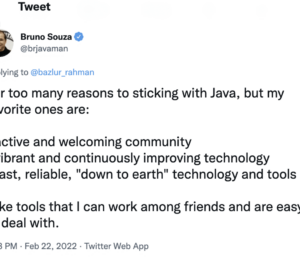Three Mistakes Junior Software Developers Make Preventing Getting Hired On Amazing Projects
- April 06, 2022
- 3754 Unique Views
- 4 min read
Being hired is not easy and it is especially somewhat tricky for junior software developers to be taken on to work on amazing projects. The reason is clear: industries always want people with the right skills and a junior software developer does not typically always have those. We get to learn to program and acquire knowledge from universities and colleges, which is not enough to be able to work on unique projects right away.
I was once a junior developer, I faced similar problems. This is so common that I get a lot of frustrating messages from junior developers. They say that they do not get to work on exciting projects. For example — one junior developer sent me messages mentioning that he is really into Java programming and wants to work on exciting projects so that he can learn. But unfortunately, he always ends up doing the same dull and simple CRUD-based projects.
Still, people are getting hired and working in big companies on amazing projects. So, there is always a way out.
From experience and from the messages I get from junior developers, I have seen three big mistakes every junior software developer makes that could easily be solved.
I will also show you what I have learned that works.
Mistake# 1: They think that the best way to get a job is to send a résumé
There is a common understanding that to be able to get hired, first, we need to work on a résumé (also known as a CV) and then to send it to hiring companies. Well, this works, sometimes, but does not, most of the time. Most of the résumé gets trashed. The reason is that the company doesn’t know you.
Let me tell you a secret: most of the best jobs do not even show up on the job board. Software industries recruit employees from their trusted networks. If their trusted network becomes exhausted, only then do they put the job out there in a job advert.
This is true. Let me tell you my story here: I got to know about my current job directly from my network. I was known to someone inside the company and I was called by them. I did not even send them my résumé.
So, the solution is simple — networking. You have to be known to the people where you want to get work. And for that, a junior developer can do the following things:
- Attend the various events (e.g., Java user group events) and talk to the people, ask questions about their work, and tell them what excites them.
- Create your online presence, create a blog and write posts about the stuff that you are learning, join an open-source project, etc.
By doing this, you will be able to get known to the people where you want to work and you will get called instead of sending a resume to them and getting it thrown in the trash by them.
Mistake# 2: They get apprehensive about the interview process
This is quite common: being worried about the interview process. It can be one of the most intimidating things because the interview is somewhat unpredictable. You cannot know in advance what questions you’re going to be asked.
I was in such a place and so I started to read many books, learn deep Java knowledge, solve random problems, and do many other similar things. At the end of the day, I felt like I was becoming crazy. And so I learned that... it’s not possible to learn everything.
Well, there is a way of making it easy(ier). Imagine a scenario where you walk into a job interview, and the interviewer looks at you, and their face lights up and says: “Hey, I know you. I’ve read your blog posts etc.”
If this happens during the interview, you can tell without even thinking too much that the chances of getting offered the job are very high.
So, sharing what you know is essential. Creating a blog where you write about stuff you know can be an excellent way to be known to the people you intend to work with.
There is another secret that no one knows: most interviewers decide to hire people based on non-technical factors. There were many cases when technically competent people didn’t get hired because of being arrogant. Therefore, being friendly and humble is always very important.
Besides, to ease the interview process, a junior developer can do the following things:
- If there are companies that you would like to work for, come up with a plan to meet at least one person working at those companies virtually or in person and build a relationship with them.
- Find a local user group, attend the meeting, introduce yourself to as many people as possible, create a network, discuss the topics that excite you, and the things you have learned.
Mistake# 3: They do not have the coding and collaboration skills needed
The crucial mistake that junior developers struggle with is not having the right coding and collaboration skills that are required to do the work they want to do. How would you do the job if you do not know how to write code, in the first place?
Software development is the most collaborative work on this planet and you have got to know how to work with a team and share your code with others. You have got to understand how version control works and also learn how to use one or more IDEs and text editors.
There are plenty of keyboard shortcuts that help you speed up coding. You have to know those. We, software developers, solve real-life problems using our coding skills. When we start writing code, it should not be the case that we are thinking about how to write a lambda expression instead of thinking about the real-world problem that we are solving.
How to use a collection framework, use generics, use IDEs, and commit to git... all of these should be in our muscle memory. Unless you master these skills, no work will be done, at least not efficiently. And if you cannot do the work, there is absolutely no point in hiring you.
Here I have rushed through the coding and collaboration skills that every junior software developer needs. Because it’s pretty impossible to get all the coding and collaboration skills a junior developer needs in detail in one post.
I will keep posting more detail in later articles in this series, so stay tuned!
Don’t Forget to Share This Post!








Comments (0)
No comments yet. Be the first.